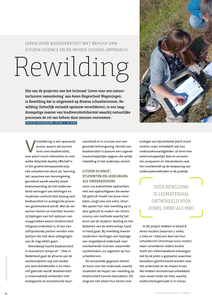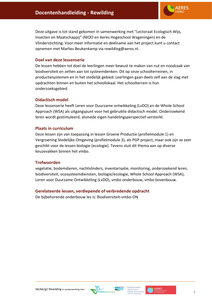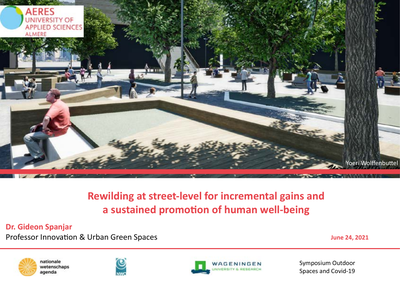This article aims to supplement the three “golden rules” of rewilding – or three Cs – the Cores, Carnivores, and Corridors – by a fourth C – Compassion, in discussing the case of Oostvaardeplassen in The Netherlands. The cores refer to large, strictly protected ecologically intact areas, carnivores refer to natural predators, and corridors connect passages for fauna movements. We propose a fourth requirement: Compassion. This fourth C would ensure that any active (re)introduction must be in the interests of the individual animals involved. This article briefly explains the history of the Oostvaardeplassen project and leads into a discussion of the scientific (biological requirements of the species, area, and species fit, etc. ) and ethical (animal welfare, ecocentrism, etc.) constraints and opportunities for rewilding. All four Cs, we argue, are absent from Oostvaardeplassen, which can be considered an example of how rewilding should not be undertaken. Against this background, we propose an alternative way forward. https://www.ecos.org.uk/ecos-406-the-golden-rules-of-rewilding-examining-the-case-of-oostvaardersplassen/ LinkedIn: https://www.linkedin.com/in/helenkopnina/
MULTIFILE

The Dutch conservation area Oostvaardersplassen was initiated as a rewilding project within the Netherlands’ protected area network. It came under the spotlight when management strategies and practices were criticized by scientists, conservation practitioners, and the public, from a number of perspectives – not all of which were compatible. This article reviews the origin, evolution, and application of the rewilding concept and examines the Oostvaardersplassen project as a case study. Our assessment demonstrates that the area was never an appropriate site for rewilding, beset by rudderless management, and led to a situation that was ecologically and ethically untenable. The case study is used to illustrate humanity’s evolving role in environmental protection where advances in the understanding of ecological complexity, animal behavior, and sentience, cannot be ignored when addressing environmental protection, problem solving, and management. Finally, it lays out options for the future in the absence of the three Cs of rewilding, the Cores, Corridors, Carnivores, and introduces the concept of the fourth C, Compassion. https://ijw.org/learning-to-rewild/ LinkedIn: https://www.linkedin.com/in/helenkopnina/
MULTIFILE

The first part of this paper provides a series of conceptual critiques to illustrate how the recent move to inaugurate a “post-nature” world works to vindicate anthropocentric perspectives and a techno-managerial approach to the environmental crisis. We contend with this premise and suggest that troubling nature has profound implications for education. In the second part, we provide case studies from nature-based programs in The Netherlands and Canada to demonstrate how anthropocentric thinking can be reinscribed even as we work towards “sustainability”. Despite the tenacity of human hubris and the advent of the Anthropocene, we suggest these troubled times are also rich with emerging “post-anthropocentric” perspectives and practices. As such we offer “rewilding” as a means to think about education that moves beyond the romantic vestiges of “Nature” without lapsing into delusions of human exceptionalism. http://dx.doi.org/10.13135/2384-8677/2334 https://www.linkedin.com/in/helenkopnina/
MULTIFILE

In 'Ecodemocracy in the Wild: If existing democracies were to operationalize ecocentrism and animal ethics in policy-making, what would rewilding look like?' Helen Kopnina, Simon Leadbeater, Paul Cryer, Anja Heister, and Tamara Lewis present a democratic approach to considering the interests of entities and the correlation of rights of nature within it. According to the authors , ecodemocracy's overarching potential is to establish the baseline principles that dethrone single species domination and elevate multiple living beings as stakeholders in all decision-making. They provide insights on how ecodemocracy could become manifest and what it takes to achieve mult-species justice. A unique contribution in this chapter is the notion of ecodemocracy in rewilding , exemplified bij the controversial Dutch rewilding experiment in Oostvaardersplassen. The authors discuss the complexities of decision-making in the interest of different species and the challenges that arise when implementing such politics.
MULTIFILE

Eén van de projecten van het lectoraat 'Leren voor een natuurinclusievesamenleving' aan Aeres Hogeschool Wageningen, is Rewilding dat is uitgevoerd op diverse schoolterreinen. Rewilding (letterlijk vertaald opnieuw verwilderen), is een laagdrempelige manier van biodiversiteitsherstel waarbij natuurlijke processen de rol van beheer door mensen overnemen.
DOCUMENT

Draagt rewilding bij aan biodiversiteitsherstel? Om die vraag te beantwoorden monitoren vmbo-leerlingen en mbo- en hbo-studenten planten en insecten op een afgebakend stukje schoolterrein waar beheer wordt losgelaten. Over het Rewilding project van Lectoraat Ecologisch Wijs van Aeres Hogeschool, met Jetske de Boer en Marlies Beukenkamp.
DOCUMENT

Dit lesmateriaal heeft tot doel de leerlingen meer bewust te maken van nut en noodzaak van biodiversiteit en zetten aan tot systeemdenken. Dit op onze schoolterreinen, in productiesystemen en in het stedelijk gebied. Leerlingen gaan deels zelf aan de slag met opdrachten binnen en buiten het schoollokaal. Het schoolterrein is hun onderzoeksgebied. Deze lessenserie heeft Leren voor Duurzame ontwikkeling (LvDO) en de Whole School Approach (WSA) als uitgangspunt voor het gebruikte didactisch model. Onderzoekend leren wordt gestimuleerd, alsmede eigen handelingsperspectief versterkt. Deze lessen zijn van toepassing in lessen Groene Productie (profielmodule 1) en Vergroening Stedelijke Omgeving (profielmodule 3), als PGP project, maar ook zijn ze zeer geschikt voor de lessen biologie (ecologie). Tevens sluit dit thema aan op diverse keuzevakken binnen het vmbo. Aanvullende trefwoorden: vegetatie, bodemdieren, nachtvlinders, inventarisatie, monitoring, onderzoekend leren, biodiversiteit, ecosysteemdiensten, biologie/ecologie, Whole School Approach (WSA), Leren voor Duurzame Ontwikkeling (LvDO), vmbo onderbouw, vmbo bovenbouw. Deze uitgave is tot stand gekomen in samenwerking met “Lectoraat Ecologisch Wijs, Insecten en Maatschappij” (NIOO) en Aeres Hogeschool Wageningen en de Vlinderstichting. Voor meer informatie en deelname aan het project kunt u contactop nemen met Marlies Beukenkamp via rewilding@aeres.nl. Bijbehorend lesmateriaal leerlingen: Rewilding leerlingmateriaal VMBO bovenbouw. Het bijbehorende lesmateriaal onderbouw: Biodiversiteit VMBO onderbouw.
DOCUMENT

Dit lesmateriaal heeft tot doel de leerlingen meer bewust te maken van nut en noodzaak van biodiversiteit en zetten aan tot systeemdenken. Dit op onze schoolterreinen, in productiesystemen en in het stedelijk gebied. Leerlingen gaan deels zelf aan de slag met opdrachten binnen en buiten het schoollokaal. Het schoolterrein is hun onderzoeksgebied. Deze lessenserie heeft Leren voor Duurzame ontwikkeling (LvDO) en de Whole School Approach (WSA) als uitgangspunt voor het gebruikte didactisch model. Onderzoekend leren wordt gestimuleerd, alsmede eigen handelingsperspectief versterkt. Deze lessen zijn van toepassing in lessen Groene Productie (profielmodule 1) en Vergroening Stedelijke Omgeving (profielmodule 3), als PGP project, maar ook zijn ze zeer geschikt voor de lessen biologie (ecologie). Tevens sluit dit thema aan op diverse keuzevakken binnen het vmbo. Aanvullende trefwoorden: vegetatie, bodemdieren, nachtvlinders, inventarisatie, monitoring, onderzoekend leren, biodiversiteit, ecosysteemdiensten, biologie/ecologie, Whole School Approach (WSA), Leren voor Duurzame Ontwikkeling (LvDO), vmbo onderbouw, vmbo bovenbouw. Deze uitgave is tot stand gekomen in samenwerking met “Lectoraat Ecologisch Wijs, Insecten en Maatschappij” (NIOO) en Aeres Hogeschool Wageningen en de Vlinderstichting. Voor meer informatie en deelname aan het project kunt u contact opnemen met Marlies Beukenkamp via rewilding@aeres.nl. Bijbehorend docentenhandleiding: Rewilding docentenhandleiding VMBO bovenbouw Het bijbehorende lesmateriaal onderbouw: Biodiversiteit VMBO onderbouw.
DOCUMENT

People during this Covid-19 year were forced to spend more time at home due to the lockdown and extreme weather conditions. Before the crisis, people already spent approximately 90 percent of their time indoors and relied on nearby public outdoor spaces for social and physical activities to maintain their health and well-being. During the pandemic, unhealthy, overcrowded, uncomfortable outdoor public spaces and a lack of greenery likely encouraged people to stay indoors even more. In city centres, greenery is often scarce: municipalities struggle to find nature-based solutions that meet the multiple functions of these areas.Fortunately, pandemics appear to spur cities to create healthier, greener environments. The nineteenth-century cholera pandemics, for example, led many western cities to establish large public parks to act as green lungs. These include Central Park and Prospect Park in New York, designed by the influential landscape architect Frederick Law Olmsted. The Covid-19 crisis creates the momentum to bring nature back into our cities and to repair vital ecosystem functions and derived Urban Ecosystem Services (UESs).In this action-research study we adopted the Panarchy model and its principle that initiatives on a fine-grained scale can eventually have a positive impact on the entire ecosystem. Green interventions at street-level hold the promise that they may activate communities to initiate change for more social-ecological resilience. This paper describes two experimental projects: The Climate Cube, installed at a shopping centre in the Nieuw-West district in Amsterdam, and the Rewilding Stepping Stones in the centre of New Town Almere. The Climate Cube consists of a pergola, large, interconnected planter boxes, and benches on each side and acts as a cool social spot. The aim is to explore how it might improve visitors’ (thermal) comfort and to build community support before larger redevelopment projects are launched. The Rewilding Stepping Stones are made of biobased and recycled materials and planted with native species to encourage nature to return to the city centre.
DOCUMENT

This chapter examines some of the challenges of unlearning anthropocentrism - i.e. the deep-seated cultural, psychological and enacted prejudices of human specialness - in nature-based early childhood education programs. We begin with a critical exploration of recent trends in environmental philosophy and the conservation sciences that seek to move beyond the so-called archaic notions of “wilderness” and “nature” towards more managerial models of human dominion over planetary “ecosystem services.” We suggest the trouble with these discursive moves is that they shirk from the courageous conversations required from environmental education in a time of ecological emergency. We conclude by drawing on research at nature-based schools in the Netherlands and Canada to illustrate the tenacity of anthropocentric “common-sense” and suggest the beginnings of pedagogy of childhoodnatures guided by notions of rewilding and ecological humility. https://doi.org/10.1007/978-3-319-51949-4_40-1 LinkedIn: https://www.linkedin.com/in/helenkopnina/
MULTIFILE
